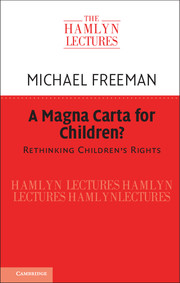Book contents
- A Magna Carta for Children?
- A Magna Carta for Children?
- Copyright page
- Dedication
- Contents
- The Hamlyn Trust
- The Hamlyn Lectures
- Preface
- Acknowledgements
- Prelude
- Part I Is it Wrong to Think of Children as Human Beings?
- Part II Even Lawyers Were Children Once
- 3 The Convention on the Rights of the Child and Its Principles
- 4 The Convention: Norms and Themes
- 5 Enforcing Children’s Rights
- 6 Criticisms of the Convention
- 7 Beyond the Convention
- 8 Interlude: What We Can Learn from the Sociology of Childhood
- 9 Childhoods and Rights
- 10 Regional Children’s Rights
- 11 Child-Friendly Justice
- 12 The World Twenty-Five Years On: New Issues and Responses
- Part III A Magna Carta for Children
- Appendices
- Bibliography
- Index
8 - Interlude: What We Can Learn from the Sociology of Childhood
from Part II - Even Lawyers Were Children Once
Published online by Cambridge University Press: 18 September 2020
- A Magna Carta for Children?
- A Magna Carta for Children?
- Copyright page
- Dedication
- Contents
- The Hamlyn Trust
- The Hamlyn Lectures
- Preface
- Acknowledgements
- Prelude
- Part I Is it Wrong to Think of Children as Human Beings?
- Part II Even Lawyers Were Children Once
- 3 The Convention on the Rights of the Child and Its Principles
- 4 The Convention: Norms and Themes
- 5 Enforcing Children’s Rights
- 6 Criticisms of the Convention
- 7 Beyond the Convention
- 8 Interlude: What We Can Learn from the Sociology of Childhood
- 9 Childhoods and Rights
- 10 Regional Children’s Rights
- 11 Child-Friendly Justice
- 12 The World Twenty-Five Years On: New Issues and Responses
- Part III A Magna Carta for Children
- Appendices
- Bibliography
- Index
Summary
A number of disciplines have something to contribute to our understanding, and propagation of children’s rights. Literary studies (Bowlby, 1969; Todres and Higinbotham, 2016) and environmental studies (Hayward, 2013) are but two examples. I look here at sociology in the belief that it can be especially valuable to advocates of children’s rights. The academic discipline of the sociology of childhood, as part of childhood studies, should be seen not as a competitor, but as a fellow warrior in the battle to dismantle ‘childism’ (Young-Bruehl, 2012), and create a better world for children. Engagement through dialogue is called for. Hitherto, the initiative has been taken by childhood studies scholars, in particular Alanen (2010) and Mayall (2000, 2002) (see also Burman, 1995; Gallagher, 2008; Lenzer, 2002;
- Type
- Chapter
- Information
- A Magna Carta for Children?Rethinking Children's Rights, pp. 253 - 263Publisher: Cambridge University PressPrint publication year: 2020

